
Passion doesn’t always pay the bills! Although it’s vital a chef is passionate about their chosen career path, it’s important to know the financial benefits to becoming a chef. Anyone thinking of entering the catering trade will want to know how much they can expect to earn.
I did some research and realised there were no independent, clear and accurate numbers showing how much chef’s actually earn. Therefor I decided to do my own research! This article is an in depth look at how much chefs earn based on real job adverts in the market, and the results are surprising.
In the UK the average chef salary is, Apprentice Chef £13,839, Commis Chef £19,694, Chef de Partie £22,080, Sous Chef £27,650, Head Chef £35,200 and an Executive Chef comes in with an average of £35,880. At all levels there are also other financial benefits that need to be taken into account.
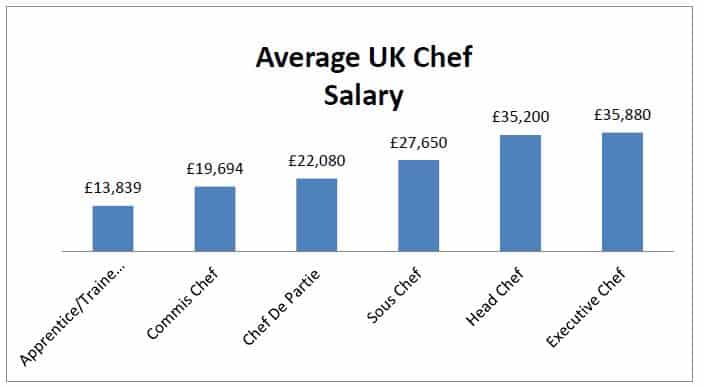
As readers can see from the above chart these are the average yearly salaries that a chef can expect to earn for each kitchen position. Under each sub heading below we’ll have a look at the numbers for each position, analyse why they are paid that amount and importantly the other benefits that chefs get which should be taken into consideration.
To collect the data I visited job sites and looked at different chef roles, taking a random sample of venues and geographical locations. As in all careers there will be outliers (jobs where the wages far exceed or fall below the average) but overall this is a great indication and the results are accurate with what industry insiders would expect to see.
A note of caution on the hourly wage figures; they are based on a 40 hour working week. Chefs are known for working long hours so be sure to get an accurate picture of expected work hours for the job you are seeking to get a true reflection of the hourly wage!
How Much Does An Apprentice/Trainee Chef Earn?
An Apprentice or Trainee Chef in the UK earns an average salary of £13,839 per year. Based on a 40 hour working week this equates to an average hourly wage of £6.65. Anyone accepting a trainee or apprentice chef role should be aware of a few important factors to check.
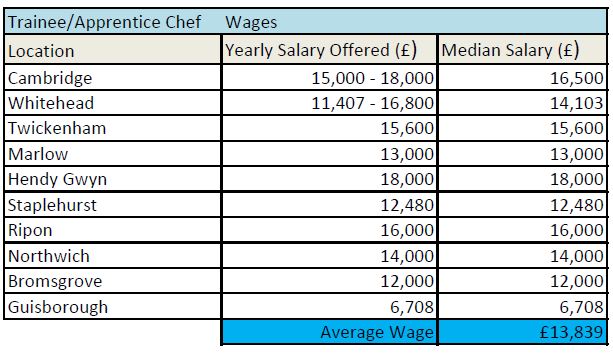
As readers can see from the table above, there is a wide range in the salaries paid to trainee/apprentice chefs.
The main reason for this is that the term trainee can be hard to define. Some kitchens like to have an apprentice in the traditional sense of the word (someone that works in the kitchen whilst also going to college to study part time)
Other kitchens use the term trainee to describe any chef that has been to culinary school but does not yet have the real world experience to be classed as a fully fledged chef.
My advice when looking at this job type is to read the job roles carefully and don’t be afraid to apply for jobs that seem slightly above your experience levels. This doesn’t mean lie on your CV! Simply be honest, but show passion. A kitchen looking for a Commis chef fresh out of culinary school may consider giving someone a traditional apprenticeship if they come across keen enough to learn.
Be aware of unscrupulous employers. 99% of kitchens are great places. However, as in any career path there are some employers who may offer an “apprenticeship” but really only want low labour costs. Be clear on what the job involves in terms of training!
Of course a chef can expect to earn less whilst learning. Just be sure that if you are sacrificing wages in order to learn the trade, that you are getting the training you were promised!
These numbers are encouraging signs that kitchens are being very fair with their trainee position wages and also encouraging that there are lots of positions out there for those looking to start a career!
How Much Do Commis Chefs Earn?
The average salary for a Commis Chef in the UK is £19,694. Based on a 40 hour working week this equates to an average of £9.46. However, the range of wages across different Commis chef roles is broad, and based on several important factors.
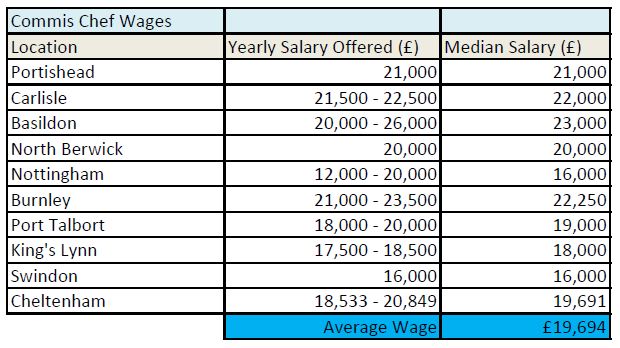
Similar to the apprentice/trainee chef description we looked at earlier, the role of a Commis chef can be varied. Different kitchens use the term to mean different things when describing the ideal chef they would like.
Some professionals would say that a commis chef is fully trained but not yet progressed to run a section. Others would say that a Commis chef is an untrained chef and they become a Chef De Partie when they have qualified.
I personally believe that a Commis chef can either be in training or fully qualified. Many kitchens do not automatically promote newly qualified chefs to the role of Chef De Partie.
As a personal example I was a Chef De Partie at my workplace when I interviewed for a Commis chef role at a 2 Michelin star restaurant. Although I was fully qualified I recognised the jump in cuisine standard would require me to go back down the ladder a position.
The career ladder of a chef is not a linear progression; they will go up and down positions based on the level of cuisine.
A Commis Chef’s wages in particular, are a balance between taking a lower wage to gain experience but also being paid for the skill set you have gained so far!
How Much Does A Chef De Partie Earn?
The average salary in the UK for a Chef De Partie is £22,080. When calculated using a 40 hour working week this equates to an hourly wage of £10.61 However, the position of Chef De Partie comes with several additional responsibilities which should be taken into account.
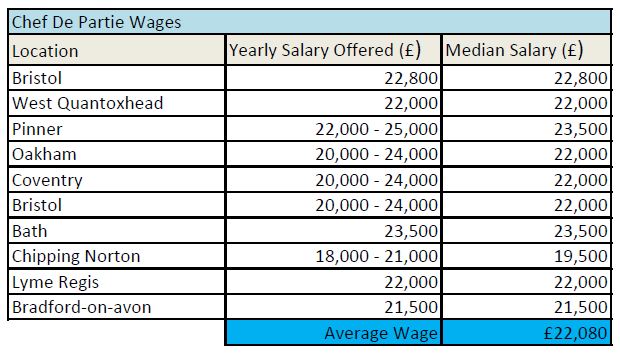
The table above shows that the salary range for Chef De Partie (CDP) roles is actually quite narrow. This is due to the fact that a CDP role is well defined and employers are after the same level of chef in most instances.
A CDP will always be referring to a qualified chef that is capable of working independently or running a section of a kitchen. The different wages reflect the different levels of cuisine, their location or any benefits (such as live in accommodation) the specific job may have.
Once a chef reaches this level they are expected to take responsibility for their own time management plus the management of any Commis chefs working beneath them. This extra responsibility can see the Chef de Parties hours increase substantially above that of a Commis chef.
Many industry professionals would argue the real hourly wage would require the salary to be divided by at least 50 hours per week. This would make an hourly rate of £8.49 on a 50 hour per week basis.
In my opinion, and experience, 50 hours per week is a more realistic estimate of what a CDP will average over the course of a year. However, whilst doing the research for this article I have been encouraged to see a number of jobs advertising that overtime is paid in addition to the salary.
The shift pattern is a large indicator of how many hours the chef is likely to do in that job role. Lots of breakfast and split shifts; chances are the hours worked per week will be high!
How Much Does A Sous Chef Earn?
The average wage for a Sous Chef in the UK is £27,650 per year. Based on a 40 hour working week this equals £13.29 per hour. Many Sous Chefs will find themselves working more than 40 hours per week; this causes their hourly rate to substantially reduce as demonstrated.
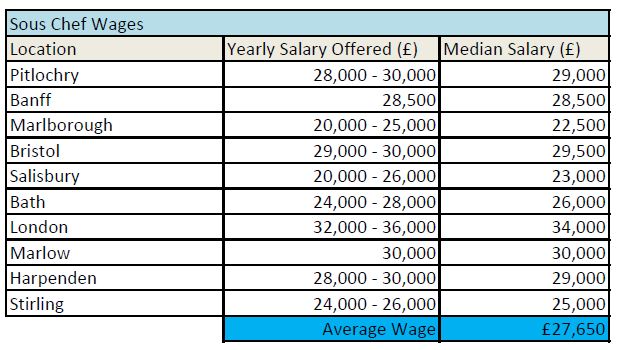
The Sous chef position is a high level one within the kitchen ranks which carries a high level of responsibility and pressure. Sous chefs are responsible for the day to day running of the kitchen. They must take the Head chefs vision and turn it into reality!
Many Sous chefs choose to ‘lead from the front’ This means that far from using there position to delegate more and work less, they are usually the first ones in the kitchen in the morning and the last ones to leave at night.
Some chefs find that the additional hours they are doing make the pay rise irrelevant on an hourly pay basis.
However, the sous chef is one step away from being a head chef and a vital stepping stone for anyone that wants to progress to run their own kitchen. As such, many sous chefs choose to not worry about the wages and focus more on the experience and learning from a great Head Chef.
How Much Do Head Chefs Earn?
The average salary for a Head Chef in the UK is £35,200. Based on a working week of 40 hours this equates to £16.92 per hour. This is a large jump in salary compared to the average Sous Chef wage and there are several important reasons for this.
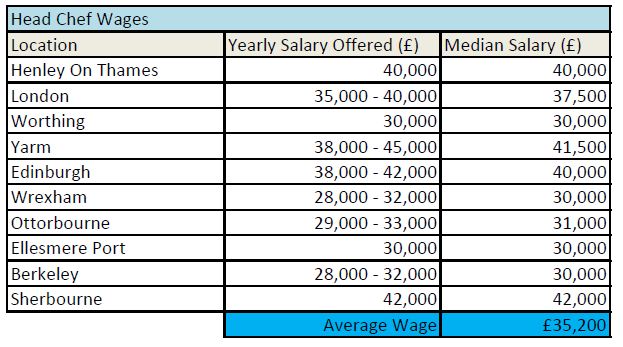
As readers can see this is a larger increase compared with stepping up through the other kitchen ranks. The main reason for this is that now the Head Chef is running the show!
When a Head Chef accepts a position within a kitchen they are not only there as another chef. Instead the head chef is the flag carrier for the restaurant. They are expected to bring their own unique flair and expertise to the role.
The Head chef has the ability to make or break a restaurants reputation and it is for this reason that they can command a much higher sum of money.
Another point evident from the table above is the large variant in salaries being offered for Head chefs. This is due to different owners expectations.
If a restaurant has a set idea of its customer base, and are more focused on a chef simply running the kitchen, they are likely to offer a lower wage and as such attract a slightly lower level chef.
If a restaurant is looking for a head chef to maintain a high standard of cuisine, or perhaps inject a new lease of life into the business, then they will be willing to pay considerably more, as it is more of a business investment.
Along with the menu planning and general day to day running of the kitchen, a Head chef must also be able to handle the paperwork side of the business. They must juggle profit margins and negotiating good deals with suppliers. This whole package is the reason businesses are willing to pay high rates for the right Head Chef.
Accepting a Head Chef position is the time when all the hard work begins to reap its rewards for many chefs that have climbed through the ranks. For those that make it this far, this is the chance to get paid well and have the control to take the cuisine in the direction they choose.
There is one more step up the ladder after becoming Head Chef and that is to the position of Executive Chef. However, this is not always the financial step up it may appear.
How Much Do Executive Chefs Get Paid?
The average salary in the UK for an Executive Chef is £35,880. Based on a working week of 40 hours this equates to £17.25 per hour. Readers will notice this is only a slight increase from the average Head Chef wage and there are some important reasons for this low increase.
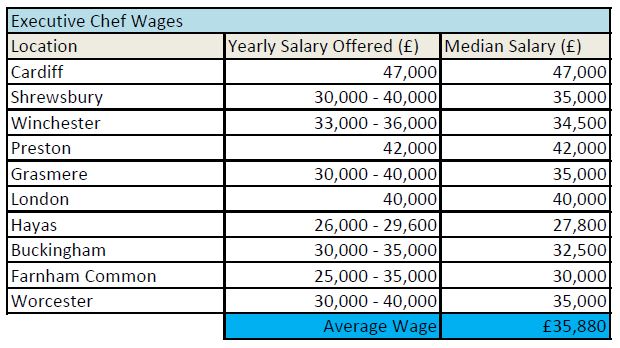
An executive chef is responsible for overseeing the Head Chef and assisting with menu planning, dealing with suppliers and generally there in an advisory role for any advice the head chef may need.
Executive chefs are typically required when a business owns more than one restaurant. As an example, perhaps a successful local restaurant has three venues in different parts of the city. The role of the executive chef is to coordinate between the three venues to ensure there is consistency among the cuisine.
- Famous chefs such as Gordon Ramsey are great examples of an executive chef. He has many restaurants that operate under his name. Therefor, although he doesn’t actually cook in any of those restaurants during a service, he is there to oversee and ensure the head chefs that he has put in place are all performing to the required standard (I’m sure he would let them know if they weren’t!)
Why do executive chefs get paid little more than head chefs?
In the example above using Gordon Ramsey it’s obvious he’ll earn lots more than the average head chef, but for regular executive chefs the story is a little different.
An executive chef role allows the chef to spend less time in the kitchen and more time experimenting with food, meeting with suppliers and dealing with the business side of a restaurant.
Many chefs see this as a huge perk of the job. Executive chefs are those that have gotten to a point in their career where doing busy service night after night takes its toll. They would prefer to carry out the other duties and not concern themselves with the day to day aspects.
Another big advantage is the working hours. Due to the fact an executive chef does not need to be in the kitchen during a busy service they will often work normal day shifts and take weekends off, similar to a regular 9-5.
It is these two main reasons why the money is less of an incentive for a head chef choosing to make the step upwards.
Whilst an executive chef should be paid more than a head chef as it is a promotion, the perks of the job mean that many would do it for a pay cut in my opinion!
Without great Head Chefs in place, an executive chef is not going to be able to execute their plans for the kitchens. The two positions must work very closely together and that is why they tend to be paid a similar wage.
Speaking of perks, I feel we must look at a few of the other financial benefits to being a chef that need to be taken into account when assessing how much chefs earn. Let’s start with accommodation.
Do Chefs Get Accommodation Provided For Free?
Typically, chefs that work in establishments such as hotels or pubs will have the option to have accommodation as part of their benefits package. Whilst it is usually not free, it is provided at a heavily subsidized price. However, there are several points to be aware of when considering staff accommodation.
If a business has rooms as part of its service, such as a hotel or a pub, they will often be able to offer their chefs some staff accommodation. This is especially true if the restaurant is in a place far of the beaten track.
This low rent accommodation can be a real perk to the chef and add up to several thousand pounds worth of savings over the course of a year. However, there are both positive and negatives to staying in staff accommodation and we will take a look and the pros and cons below.
Advantages of a chef staying in staff accommodation
- Very inexpensive: Usually the cost will be less than half the price of renting in the open market.
- Close to work: For places that are isolated this is a must due to the unsociable hours chefs are required to work. Staff accommodation nearby solves the problem of finishing a shift late at night and discovering you have missed the last bus!
- Great for split shifts: If a chef only gets a few hours break in the day, having the staff accommodation close by means they can pop home for a few hours rest. Those working far from home can find themselves having to hang around work on their break as there is not enough time to go home.
- Great for new areas: If a chef moves to a new area then having accommodation all taken care of for them is a real perk. For those that like moving around a lot it also prevents the hassle of being tied down into long leases and moving furniture etc.
Disadvantages of a chef staying in staff accommodation.
- Poor standard: Staff accommodation is renowned for not being maintained to the highest standard. As it’s only for the staff they tend to be last in line to have issues fixed and the only person you can complain to about your accommodation is your own boss!
- Close to work: This was a positive but can also be a negative. It can be hard to unwind and stop thinking about work when you have a day off if you can see your place of work out the window!
- Other staff members: Staff accommodation is generally shared with other members of the staff. This can be great if you all get on well, but less fun if someone annoys you at work and you have to then see them at home as well.
- Difficult to separate personal and professional life: Most people in a kitchen love nothing more than a good gossip (like many work places!) If you live with the people you work with, trying to keep your personal life separate can be tricky. There’s no pulling a sickie if half your work mates know you didn’t get home until the early hours of the morning!
Staff accommodation divides a lot of chef’s opinions. Some love it whilst some hate it. For those that love it the financial savings and the freedom to move around are great perks that should not be underestimated.
Whilst staff accommodation is a big money saver, there is another money earner that chefs need to take into account when assessing the financial benefits of a job, and that is tips.
Do Chefs Get Tips?

Most chefs receive tips in some form. Some staff share all their tips equally, including with the chefs. Other restaurants choose to give the kitchen staff a cut of the tips, for example 10% of all the tips earned that night. It’s important a chef understands and is happy with the individual arrangements of that restaurant before agreeing to work there.
When tips are shared evenly it can add up to a large amount of money each week. Tips of £50 – £100 per week are not uncommon to kitchen staff. This is a large amount of money when calculated over an entire year.
Any tips provided via the restaurant; ie if paid on a card machine when paying the bill, will be taxed before being given to the chef in their wages. For any tips given by customers in cash; it is important that chefs declare them on their tax returns as income.
With the large sums of money involved tips can unfortunately cause arguments among staff. Being happy with the arrangement up front will prevent any problems arising in the future.
Do Chefs Get Free Staff meals?
Many kitchens will provide free staff meals for everyone whilst on duty. The standard can range from superb to very basic. This can be a big cost saving to the employees, but there are also some disadvantages which need to be taken into account.
The fact that meals are provide is a great way for staff to save money and should be taken into account when assessing the wage of a particular job role. Chefs spend a lot of time at work. If all three of a chef’s main meals are provided for that day, then effectively their food costs for an entire day are zero.
Chefs also have the perk of being able to pick at food as they go. This means they can sample the highest cuisine possible for free! The only time I have tried 2 Michelin star cuisine is when I worked in the kitchen for free!
The downside of the free staff meals is that the standard tends to be a little hit and miss.
In one kitchen I worked in the budget for providing staff meals to a large amount of staff (about 30 people per shift) was £0. That’s right there was no budget whatsoever allocated to the staff meal allowance.
As readers can imagine, this makes the standard fluctuate widely. Sometimes meals would consist of left-overs from a function or the service the night before and staff would find themselves enjoying beef wellington for example. On other less fortunate days the staff would be served chicken nuggets, chips and beans.
The standard of the meal is dictated by two factors
- Number 1: The quality of the produce at the chefs disposal. If the head chef gives the chef cooking the staff food left over chicken portions, then great they can produce some excellent food. If all that’s available is some old vegetables then it becomes more of a challenge.
- Number 2: How much time the chef cooking staff meals has. The customers come first and the staff meals are an after-thought in most cases. If the chef is really up against it time wise then the staff meals are going to suffer to ensure they are ready for service for the paying customers.
Regardless of whether the standard that day is high or not, having all your meals provide for free is a perk that has a real financial benefit to any chefs working there.
A final financial benefit that needs to be included in the overall wage a chef earns is whether or not they have to buy their own uniform.
Are Chef Uniforms Provided By The Employer?
In larger kitchens chefs are provide their uniforms for free. They also tend to be washed for free saving the chefs not only time but also a substantial amount of money. Providing and washing the uniforms is a big advantage for chefs but there are some drawbacks as well.
The advantages of an employer providing chef uniforms are
- Its free: Chef uniform is expensive and being give it all is a big cost saver.
- It gets washed for you: The time saved not having to wash your uniform is great. Every few days a new stack of clean chef whites is placed in your locker at work. Brilliant!
- Everyone wears the same: There’s no need to worry about which colour chef whites to buy, or whether to go traditional or modern. This is all taken care of.
The disadvantages of an employer providing chef uniforms
- The type of uniform: The uniform type is not always to everyone’s liking. Some chefs prefer high quality whites that are ultra-breathable and lightweight. Workplaces tend to go with value for money options. If you are used to higher quality uniform this can be a problem.
Lost in Laundry: With so many uniforms to wash it’s not uncommon for yours to go missing. Laundry services rely on a bar code system, but as with all systems this can fail. I’ve spent many a morning hunting through lockers trying to find my uniform!
Whilst less of a financial benefit than tips or staff meals, being provided with uniform is still a consideration. It’s not just the financial benefit, the time saved in not having to spend your precious days off washing uniform is a real morale booster.
To Sum Up
I’m sure readers will now have a better understanding of the wages they can expect to earn as a chef plus the benefits that need to be taken into account when looking at the numbers!
I’ve chosen to focus on the UK as this is the market I know best. Other countries have completely different pay scales when it comes to being a chef. As an example, I am informed by chef friends that have worked in Australia that this country pays it chefs a very good hourly wage.
Any chef that has high ambitions for earning large sums of money should focus on building their own personal brand. Whilst becoming famous may be a long shot, becoming well known in the chef community is definitely achievable.
Once a chef becomes well known they can bring customers with them to new ventures and can ultimately demand a much higher price for their services.
For any readers who would like the pdf containing all the tables I will link it below.
